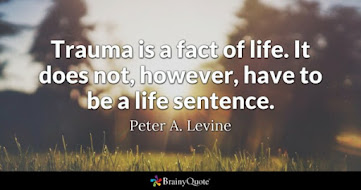Adverse Childhood Experiences certainly can last a lifetime. But they don’t have to.
Adverse Childhood Experiences certainly
can last a lifetime. But they don’t have to.
An
Adverse Childhood Experiences (ACE) is growing up with one or more of the
following in the household prior to turning
18:
Recurrent
physical abuse
Recurrent
emotional abuse
Contact
sexual abuse
An
alcohol and/or drug abuser in the household
An
incarcerated household member
Someone
who is chronically depressed, mentally ill, institutionalized, or suicidal
Domestic
violence
One
or no parents
Emotional
or physical neglect
The
health impacts of ACE first came to light during a ground-breaking study
conducted by the Centre for Disease Control and Kaiser Permanente between 1995
and 1997. This study identified relationships between the breadth of the
exposure to abuse or household challenges during childhood and multiple risk
factors for several of the leading causes of death in adults. This study is
known as the Adverse Childhood Experiences study.
Maria
grew up one of three children. Her father was an alcoholic and her mother
suffered from depression. Both parents struggled with finding and keeping
employment and the family was very poor. Sometimes, there was not enough money
to buy food. Because both her
parents were sick, they sometimes did not take adequate care of the children.
Shanta
grew up with a maid, who was sexually abusing her for six years of her life and parents were absolute
unaware of the situation. As a
consequence, Shanta had trouble
paying attention in school so she often earned poor grades and got into fights,
and during her adolescence she
was scared of being in relationships.
Shyam
was in a confused state of insecurity, because her mother remarried but did not
get along with her stepfather.
Eventually, he became a very stubborn and arrogant child. When he got in
trouble at school, his father sometimes even
hit him.
When
Aman was in middle school, her mother attempted suicide. Fortunately, she
recovered, but Aman’s family was deeply affected and his dad left the house.
Aman shared his story while he was in a de-addiction Centre.
These
stories are fictional examples, which
reflects realities which we come across as professionals, working with children of different socio-economic
Background.
How
many children have been affected by suicide? Divorce? Violence at home?
Substance abuse? Poverty? Lack of opportunities? These experiences are commonly
described as ACE, or Adverse Childhood Experiences.
Child
abuse and trauma in the household leave a child incredibly vulnerable which has
the potential, in early years, to disrupt the normal development of the brain.
Adverse Childhood Experiences appear to be associated with a predictable path
towards disease and disability. Recognizing this path and tackling it at the
earliest possible opportunity is crucial to give children the chance to develop
as they ought to so that they can play as full a role in society in the future,
in the healthiest possible state, that they deserve to.
People
who have experienced ACE should be aware of their effects so they can seek
appropriate health care when needed. They can also get professional and social
support to improve their lives and avoid allowing ACE to impact their children,
families, and futures. Some ACE survivors find they understand themselves
better after learning about ACE and considering their own experiences.
Everyone should know about ACE! Its impact on individuals and on our communities is important.
Healthcare Providers
Healthcare
providers of all types including traditional practitioners, physicians,
therapists, midwives, nurses, and others-should understand ACE and it’s impact
on physical and mental health. This information can help them understand and
help their patients efficiently and make appropriate referrals and screenings.
Teachers and Others Working with Children
Teachers
and others who work with children are sometimes the first and only individuals
outside of a family to recognize when children are currently experiencing ACE.
They can provide initial support and referrals to help the children and their
families. Understanding ACE can also help teachers and others better understand
their children's challenges, behaviors, and needs.
Recommended strategies to reduce ACE in localized
area and to build stronger communities:
Increasing
public understanding of ACE and its impact
on health and well-being.
Enhancing
the capacity of families and healthcare providers to prevent and respond to ACE.
Improving
the effectiveness of public-health campaigns by refining their messages
regarding ACE.
Promoting
identification and early intervention of ACE through universal screening or
assessment within child and family health systems.
By
Dr.
Mona Shah
Occupational
Therapist, Clinical Psychologist






Comments
Post a Comment